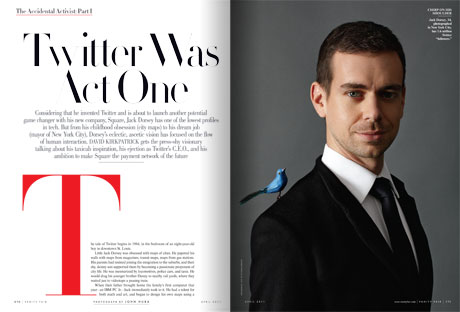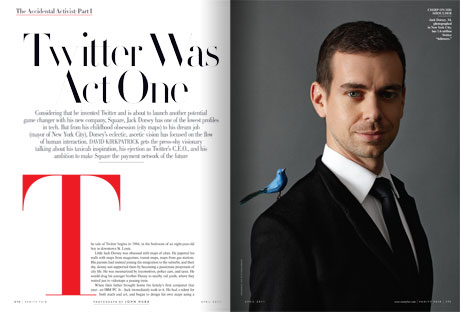
Jack Dorsey gets the Vanity Fair treatment in a long profile written by David Kirkpatrick (author of The Facebook Effect). It goes over familiar ground for anyone who’s been following Dorsey—his obsession with maps and cities, the founding of Twitter, his ouster, and more recently new company Square (which is doing just fine, thank you). But Kirkpatrick pulls it all together into a cohesive narrative peppered with some new details.
You learn, for instance, that “Dorsey’s personal wealth may well exceed $300 million,” Square now has 78 employees and that one day, he says, he wants to become the Mayor of New York City. But it took him a while to find himself. In addition to being a programmer and entrepreneur, Dorsey also tried his hand at being a botanical illustrator, a certified massage therapist, and even took classes in fashion design to try to learn to design jeans (he only got as far as skirts, though, before Twitter took off).
The article also delves into Dorsey’s strained relationship with Twitter co-founder and former CEO Evan Williams. “Dorsey and Williams, to this day, rarely speak to each other beyond occasional exchanges at board meetings,” Kirkpatrick writes. In a passage that delves into those days when Twitter was melting down every day and Dorsey was replaced by Ev as CEO, Dorsey describes how being replaced from his own company made him feel: “It was like being punched in the stomach.” Here is the full passage:
Looking back, Dorsey admits he was a flawed manager: “I let myself be in a weird position because it always felt like Ev’s company. He funded it. He was the chairman. And I was this new guy who was a programmer, who had a good idea. I would not be strong in my convictions, basically, because he was the older, wiser one.” Dorsey did a poor job explaining where he wanted the company to go.
“It just got a lot bigger a lot faster than anyone expected,” says Williams. “A year and a half later we’d raised $20 million, and the servers were crashing every day. It wasn’t so much that the ship was sinking, but more ‘Great job, Jack—we’ve got to up our level of experience and lay some foundation for a much bigger organization.’ ” Others say the two were barely speaking by then, and in October 2008, Williams took the C.E.O. job for himself. Dorsey became chairman, but was no longer an employee.
He was devastated to be ejected again from a company that was building a product he’d conceived. “It was like being punched in the stomach,” he says in a rare moment of candor on the subject. Fred Wilson, who had joined Twitter’s board, puts a more benign spin on the breakup: “Ev and Jack are a little like John and Paul. They made great music together for a while, but then they both kind of got ambitious about things and didn’t see eye to eye anymore.”
Dorsey is still the second largest individual shareholder in Twitter after Williams, and recently he’s been more active at the company in an advisory role. But his new obsession is Square and building a mobile payments system that can turn anybody into a merchant. He’s taken the lessons he learned at Twitter and is applying them to his new company. Dorsey also channels Steve Jobs:
“Payment is another form of communication,” he says, “but it’s never been treated as such. It’s never been designed. It’s never felt magical. About 90 percent of Americans carry cards, but almost nobody can accept them. We want to balance that out and just make payments feel amazing.” Dorsey talks about how Square must be “pixel-perfect,” and staffers tell stories about him agonizing over the exact location and thickness of a line on e-mailed receipts.
Dorsey’s ambitions for Square are suit- ably grand. “I think Twitter is the future of communications,” he says, “and Square will be the payment network. We’re going big.”
Maybe becoming Mayor of New York City will have to wait. In the meantime, he has a suggestion for the New York Taxi and Limousine Commission: Rip out the blaring video screens in the back of taxis and replace them with iPads (and Square credit-card swipers).
